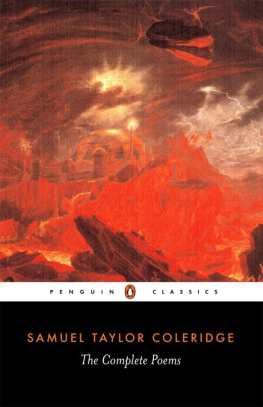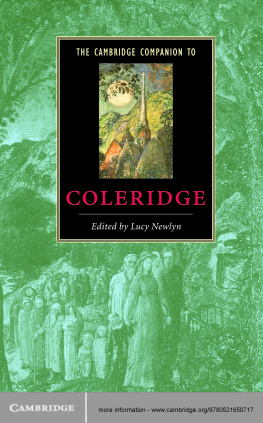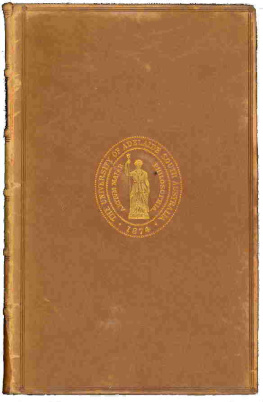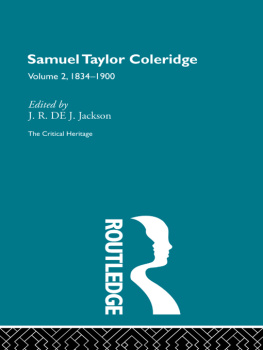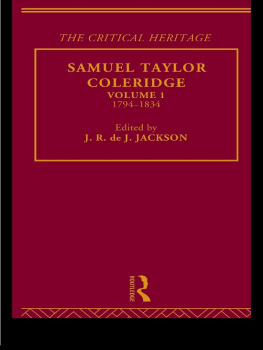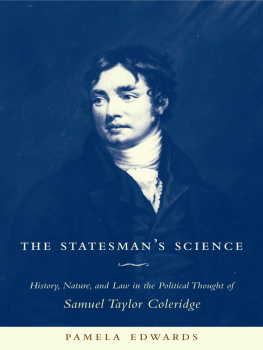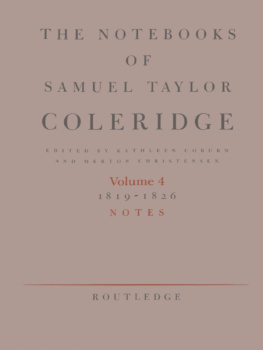Samuel Coleridge - Lyrical Ballads, With a Few Other Poems (1798)
Here you can read online Samuel Coleridge - Lyrical Ballads, With a Few Other Poems (1798) full text of the book (entire story) in english for free. Download pdf and epub, get meaning, cover and reviews about this ebook. year: 2005, genre: Art. Description of the work, (preface) as well as reviews are available. Best literature library LitArk.com created for fans of good reading and offers a wide selection of genres:
Romance novel
Science fiction
Adventure
Detective
Science
History
Home and family
Prose
Art
Politics
Computer
Non-fiction
Religion
Business
Children
Humor
Choose a favorite category and find really read worthwhile books. Enjoy immersion in the world of imagination, feel the emotions of the characters or learn something new for yourself, make an fascinating discovery.

- Book:Lyrical Ballads, With a Few Other Poems (1798)
- Author:
- Genre:
- Year:2005
- Rating:4 / 5
- Favourites:Add to favourites
- Your mark:
- 80
- 1
- 2
- 3
- 4
- 5
Lyrical Ballads, With a Few Other Poems (1798): summary, description and annotation
We offer to read an annotation, description, summary or preface (depends on what the author of the book "Lyrical Ballads, With a Few Other Poems (1798)" wrote himself). If you haven't found the necessary information about the book — write in the comments, we will try to find it.
Lyrical Ballads, With a Few Other Poems (1798) — read online for free the complete book (whole text) full work
Below is the text of the book, divided by pages. System saving the place of the last page read, allows you to conveniently read the book "Lyrical Ballads, With a Few Other Poems (1798)" online for free, without having to search again every time where you left off. Put a bookmark, and you can go to the page where you finished reading at any time.
Font size:
Interval:
Bookmark:
LYRICAL BALLADS,
WITH A FEW OTHER POEMS.
ADVERTISEMENT.
It is the honourable characteristic of Poetry that its materials are to be found in every subject which can interest the human mind. The evidence of this fact is to be sought, not in the writings of Critics, but in those of Poets themselves.
The majority of the following poems are to be considered as experiments. They were written chiefly with a view to ascertain how far the language of conversation in the middle and lower classes of society is adapted to the purposes of poetic pleasure. Readers accustomed to the gaudiness and inane phraseology of many modern writers, if they persist in reading this book to its conclusion, will perhaps frequently have to struggle with feelings of strangeness and aukwardness: they will look round for poetry, and will be induced to enquire by what species of courtesy these attempts can be permitted to assume that title. It is desirable that such readers, for their own sakes, should not suffer the solitary word Poetry, a word of very disputed meaning, to stand in the way of their gratification; but that, while they are perusing this book, they should ask themselves if it contains a natural delineation of human passions, human characters, and human incidents; and if the answer be favourable to the author's wishes, that they should consent to be pleased in spite of that most dreadful enemy to our pleasures, our own pre-established codes of decision.
Readers of superior judgment may disapprove of the style in which many of these pieces are executed it must be expected that many lines and phrases will not exactly suit their taste. It will perhaps appear to them, that wishing to avoid the prevalent fault of the day, the author has sometimes descended too low, and that many of his expressions are too familiar, and not of sufficient dignity. It is apprehended, that the more conversant the reader is with our elder writers, and with those in modern times who have been the most successful in painting manners and passions, the fewer complaints of this kind will he have to make.
An accurate taste in poetry, and in all the other arts, Sir Joshua Reynolds has observed, is an acquired talent, which can only be produced by severe thought, and a long continued intercourse with the best models of composition. This is mentioned not with so ridiculous a purpose as to prevent the most inexperienced reader from judging for himself; but merely to temper the rashness of decision, and to suggest that if poetry be a subject on which much time has not been bestowed, the judgment may be erroneous, and that in many cases it necessarily will be so.
The tale of Goody Blake and Harry Gill is founded on a well-authenticated fact which happened in Warwickshire. Of the other poems in the collection, it may be proper to say that they are either absolute inventions of the author, or facts which took place within his personal observation or that of his friends. The poem of the Thorn, as the reader will soon discover, is not supposed to be spoken in the author's own person: the character of the loquacious narrator will sufficiently shew itself in the course of the story. The Rime of the Ancyent Marinere was professedly written in imitation of the style, as well as of the spirit of the elder poets; but with a few exceptions, the Author believes that the language adopted in it has been equally intelligible for these three last centuries. The lines entitled Expostulation and Reply, and those which follow, arose out of conversation with a friend who was somewhat unreasonably attached to modern books of moral philosophy.
THE RIME OF THE ANCYENT MARINERE,
IN SEVEN PARTS.
ARGUMENT.
How a Ship having passed the Line was driven by Storms to the cold Country towards the South Pole; and how from thence she made her course to the tropical Latitude of the Great Pacific Ocean; and of the strange things that befell; and in what manner the Ancyent Marinere came back to his own Country.
I.
It is an ancyent Marinere,
And he stoppeth one of three:
"By thy long grey beard and thy glittering eye
"Now wherefore stoppest me?
"The Bridegroom's doors are open'd wide
"And I am next of kin;
"The Guests are met, the Feast is set,
"May'st hear the merry din.
But still he holds the wedding-guest
There was a Ship, quoth he
"Nay, if thou'st got a laughsome tale,
"Marinere! come with me."
He holds him with his skinny hand,
Quoth he, there was a Ship
"Now get thee hence, thou grey-beard Loon!
"Or my Staff shall make thee skip."
He holds him with his glittering eye
The wedding guest stood still
And listens like a three year's child;
The Marinere hath his will.
The wedding-guest sate on a stone,
He cannot chuse but hear:
And thus spake on that ancyent man,
The bright-eyed Marinere.
The Ship was cheer'd, the Harbour clear'd
Merrily did we drop
Below the Kirk, below the Hill,
Below the Light-house top.
The Sun came up upon the left,
Out of the Sea came he:
And he shone bright, and on the right
Went down into the Sea.
Higher and higher every day,
Till over the mast at noon
The wedding-guest here beat his breast,
For he heard the loud bassoon.
The Bride hath pac'd into the Hall,
Red as a rose is she;
Nodding their heads before her goes
The merry Minstralsy.
The wedding-guest he beat his breast,
Yet he cannot chuse but hear:
And thus spake on that ancyent Man,
The bright-eyed Marinere.
Listen, Stranger! Storm and Wind,
A Wind and Tempest strong!
For days and weeks it play'd us freaks
Like Chaff we drove along.
Listen, Stranger! Mist and Snow,
And it grew wond'rous cauld:
And Ice mast-high came floating by
As green as Emerauld.
And thro' the drifts the snowy clifts
Did send a dismal sheen;
Ne shapes of men ne beasts we ken
The Ice was all between.
The Ice was here, the Ice was there,
The Ice was all around:
It crack'd and growl'd, and roar'd and howl'd
Like noises of a swound.
At length did cross an Albatross,
Thorough the Fog it came;
And an it were a Christian Soul,
We hail'd it in God's name.
The Marineres gave it biscuit-worms,
And round and round it flew:
The Ice did split with a Thunder-fit;
The Helmsman steer'd us thro'.
And a good south wind sprung up behind,
The Albatross did follow;
And every day for food or play
Came to the Marinere's hollo!
In mist or cloud on mast or shroud
It perch'd for vespers nine,
Whiles all the night thro' fog-smoke white
Glimmer'd the white moon-shine.
"God save thee, ancyent Marinere!
"From the fiends that plague thee thus
"Why look'st thou so?"with my cross bow
I shot the Albatross.
II.
The Sun came up upon the right,
Out of the Sea came he;
And broad as a weft upon the left
Went down into the Sea.
And the good south wind still blew behind,
But no sweet Bird did follow
Ne any day for food or play
Came to the Marinere's hollo!
And I had done an hellish thing
And it would work 'em woe:
For all averr'd, I had kill'd the Bird
That made the Breeze to blow.
Ne dim ne red, like God's own head,
The glorious Sun uprist:
Then all averr'd, I had kill'd the Bird
That brought the fog and mist.
Font size:
Interval:
Bookmark:
Similar books «Lyrical Ballads, With a Few Other Poems (1798)»
Look at similar books to Lyrical Ballads, With a Few Other Poems (1798). We have selected literature similar in name and meaning in the hope of providing readers with more options to find new, interesting, not yet read works.
Discussion, reviews of the book Lyrical Ballads, With a Few Other Poems (1798) and just readers' own opinions. Leave your comments, write what you think about the work, its meaning or the main characters. Specify what exactly you liked and what you didn't like, and why you think so.

